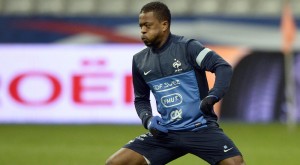
French national football team’s defender Patrice Evra takes part in a training session on November 18, 2013, on the eve of the World Cup 2014 qualifying football match against Ukraine, at the stade de France in Saint-Denis, outside Paris. AFP FILE PHOTO
PARIS, France—There will be a lot more than a World Cup place on the line when France take on Ukraine in the decisive second-leg of a qualifying play-off here on Tuesday.
In a country beset by economic woes, the national football team has become a lightning rod for the country’s problems and, for many, an unloved symbol of everything that has gone wrong in recent years.
In purely football terms, it all went wrong for Didier Deschamps’s squad in Kiev on Friday night, a disjointed performance resulting in a 2-0 defeat they must overturn at the Stade de France to secure a ticket to Brazil.
If they fail, the 1998 winners will be the only previous champions not present next year in the spiritual home of football.
It will also be the first time in 20 years that France has failed to reach the finals of a major tournament. And all the signs are that the backlash will be every bit as fierce this time around as it was after the failure to reach USA ’94, when David Ginola was made the scapegoat for a decisive home defeat by Bulgaria.
After the debacle of France’s participation in the last World Cup, when a talent-rich squad was eliminated in the first round after a player mutiny, “Les Bleus” will not be easily forgiven for giving the country the blues once more.
“The national team is a sort of mirror for society,” says Pascal Boniface, director of the IRIS think tank in Paris. “When their results are good, everyone feels better about themselves, a bit more enthusiastic.
“But if they’re bad, it gets taken as yet another sign of the country’s decline.”
But it is not just on the economic front that football matters: the fate of the national team has also become closely related to the racial fault lines of French society.
When a multi-racial squad triumphed on home soil in 1998 under the leadership of Zinedine Zidane, the subsequent celebrations were hailed as a watershed moment, a symbol of a country that had overcome its racial tensions and embraced a new multicultural model for the future.
Optimism of ’98 evaporated
But by 2010, the optimism generated by the success of the black-white-Arab class of ’98 had evaporated.
The divisions that beset the squad in South Africa were more about cliques linked to education and background than race.
But the opprobrium that followed the early exit from the tournament did have racial overtones, with two black players, Patrice Evra and Nicolas Anelka, and Samir Nasri, who is of Algerian heritage, identified as three of the four principal troublemakers in the squad.
The squad’s reputation has barely recovered since South Africa and some commentators fear that attacks on ‘overpaid, spoilt’ footballers with ‘no class, no education’ has become a subtle way of expressing what is, in reality, a general hostility towards the immigrant-dominated poorest suburbs of France’s cities.
“The deepening of the economic crisis makes people look for scapegoats,” said sociologist Stephane Beaud. “Striking footballers, ‘brown or black, can’t speak proper French’- in the eyes of their critics they represent all that is bad about contemporary society.
“A kind of collective hysteria has developed around this team. Every player is scrutinized anxiously to see who knows the words to La Marseillaise- any player who doesn’t sing along becomes a poor Frenchman.”
Veteran far-right politician Jean-Marie Le Pen has long questioned the loyalty of players from immigrant families but it is not only on the fringes of politics that the issue of the racial make-up of the squad is an issue.
In 2011, it emerged that some coaches in the French Football Federation wanted to limit the number of black or Arab players being selected for elite youth academies to ensure a better supply of white players into the national squad.
For Le Pen, the worst outcome on Tuesday evening would be a heroic victory for France, says Boniface.
“For some people there is a particular relish in seeing the national team beaten,” he said. “If you argue that blacks and Arabs are too dominant in the team, then a victory will only disprove your theories.
“But it is a crazy view to say the problem is the players not sweating for the shirt. On Friday they come up against opponents who were better than them. On Tuesday they will be desperate to get to Brazil. To think anything else is just stupid.”

